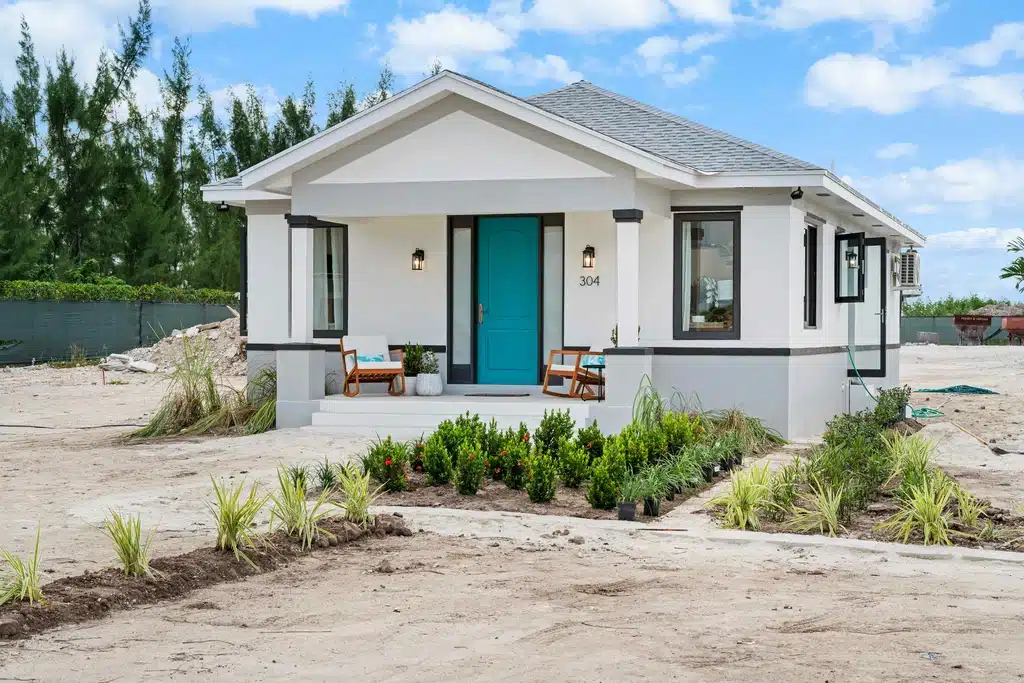In a significant leap towards sustainable housing, the first-ever climate resilient, carbon negative abode, christened ‘Home for the World’, has been unveiled in Nassau, Bahamas.
This pioneering 1,250 square foot dwelling, created by Partanna Global is meticulously engineered to not just negate its own carbon footprint, but to actively combat climate change by removing and avoiding 182.6 metric tonnes of CO2 – a green breakthrough equivalent to the annual carbon absorption of 5,200 mature trees. This is a stark contrast to the conventional concrete home which on production alone, accrues a carbon debit of 70.2 tonnes.
According to a report in World Cement, this innovative ‘Home for the World’ is the first of 1,000 planned homes envisioned in a landmark agreement with the Bahamian government, inked at the COP27 summit.
Prime Minister and Finance Minister of the Commonwealth of The Bahamas, the Honourable Philip E. Davis, K.C., M.P., commented: “Standing on the forefront of climate peril, we Bahamians have always been bound by resilience and innovation. Today, as we unveil the world’s first carbon-negative concrete home right here in Nassau, it is a testament that the answers to our global crises often come from those most affected. This cement-free marvel not only absorbs CO2 but thrives when exposed to seawater.
“I am immensely proud that it is a Bahamian entrepreneur leading this revolution, showing the world that when we say time is running out, we also mean it’s time to build anew. We are not just on the frontline of climate change; we are the frontline of solutions.”

Prime Minister and Finance Minister of the Commonwealth of The Bahamas, the Honourable Philip E. Davis. Picture by Alan Santos/PR
The calamitous impact of climate change and escalating extreme weather occurrences have seen a steep rise in natural catastrophes over the past five decades, with impoverished nations bearing the brunt. The World Meteorological Organisation underscores this grim reality, attributing two million fatalities and a staggering US$4 trillion loss to extreme weather events within this timeframe.
This was a key area of discussion at the COP28 climate change conference in Dubai, where low-lying countries in particular pushed for adequate funding for climate adaptation and mitigation. They partially succeeded, but didn’t get all the money they wanted.
Contrary to traditional concrete that deteriorates upon seawater exposure, Partanna’s novel material strengthens on contact with brine.
Rick Fox, NBA legend, Bahamian native, and Partanna Global co-founder remarked on the unveiling, “The world is forecast to build an area equivalent to the size of The Bahamas every three years. The need to disentangle development from pollution has never been more pressing.
“Our ‘Home for the World’ is the answer to this challenge, and The Bahamas, having experienced the devastation of Hurricane Dorian first-hand, is the symbolic birthplace for our movement to change the way the world builds – for good.”
The stark reality of cement contributing around 8% of global CO2 emissions, juxtaposed with the UN’s forecast of three billion individuals requiring housing by 2030, accentuates the Herculean challenge that lies ahead. Partanna’s ambition, shaped by the personal journeys of co-founders Rick Fox and Sam Marshall, is to sever the detrimental connection between development and pollution.
With existing establishments in Westlake, LA, a rapid amplification of Partanna’s production is imminent, including an impending foray into the US market. This expansion is bolstered by strategic alliances with Red Sea Global and Diriyah Company, aiming to metamorphose giga-cities in the Gulf.
Partanna’s green ethos transcends homes. It garners high-value, Verra-certified carbon credits and has clinched Interrek certification, affirming its concrete’s adherence to global standards. Remarkably, in terms of compressive strength, its concrete solution trumps traditional variants, with its standard CMU block estimated to be 25% mightier than a conventional concrete CMU block, heralding a new era of eco-conscious, robust construction.

